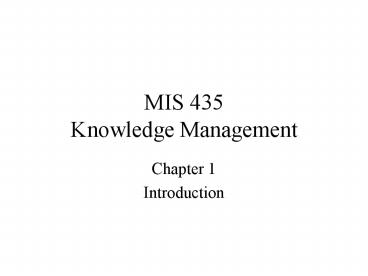MIS 435 Knowledge Management PowerPoint PPT Presentation
1 / 12
Title: MIS 435 Knowledge Management
1
MIS 435Knowledge Management
- Chapter 1
- Introduction
2
Objectives
- Define knowledge management
- Evaluate knowledge managements value proposition
- Define what knowledge management is not
- Identify types of organizations ready for
knowledge management - Identify a 10-step road map to KMS implementation
3
What is Knowledge Management?
- First, we need to answer the questions
- What is knowledge?
- Are data, information, and knowledge all the same?
4
Useful Definitions
- Data facts, numbers, or individual entities
without context or purpose - Information data that has been transformed and
may have relevance, limited context, or some
meaning - Data endowed with relevance and purpose
- (Peter Drucker)
5
Knowledge
- A fluid mix of experience, values, contextual
information, and grounded intuition that provides
an environment and framework for evaluating and
incorporating new experiences and information - (Amrit Tiwana)
- The human capacity (potential and actual ability)
to take effective action in varied and uncertain
situations - (Alex Bennet, CIO/CKO US Dept. of Navy)
- Information on which we can take action for and
advantage
6
Types of Knowledge
- Explicit easily codified characterize by
clarity and certainty - Tacit difficult to codify, document, or explain
characterized by uncertainty and heuristics
7
What is Knowledge Management?
- A business strategy, best practice transfer,
personal learning, customer intelligence,
intellectual asset management, and innovation - (Am. Productivity Quality Center)
- An emerging discipline that stresses a
formalized, integrated approach to managing an
enterprises intangible information assets. It is
a coordinated attempt to tap the unrealized
potential for sharing and reuse that lies in an
enterprises collective consciousness. - (Gartner Group)
- Providing the right information to the right
decision maker at the right time, thus creating
the right conditions for new knowledge to be
created. - (Dow Chemical)
8
What is Knowledge Management? (concluded)
- The management of organizational knowledge for
creating business value and generating a
competitive advantage - (Amrit Tiwana)
- The systematic process of creating, maintaining,
and nurturing an organization to make best use of
knowledge to achieve - Sustainable competitive advantage, or
- Sustainable high performance
- (Alex Bennet, CIO/CKO US Dept. of Navy)
9
Knowledge Managements Value Proposition
- Knowledge integration is the engine of economic
prosperity - Unpredictable markets necessitate organized
abandonment - KM lets you lead change, rather than vice versa
- Cross-industry Complexity
- Avoid repeating mistakes
- Globalization
- Tacit knowledge is mobile
- Knowledge application requires a culture of
sharing
10
What Knowledge Management is Not
- Not the same as knowledge engineering
- Not totally about digital networks, but is about
processes - Not about building a smarter intranet
- Not a one-time investment
- Not about enterprise wide information super
highways
11
Types of Organizations Ready for Knowledge
Management
- Those that want to keep up (and survive)
- Those that want to lead (movers and shakers)
12
10-Step Road Map to Implementing Knowledge
Management
- Analyze the existing infrastructure
- Align knowledge management and business strategy
- Design the knowledge management infrastructure
- Audit existing knowledge assets and systems
- Design the knowledge management team
- Create the knowledge management blueprint
- Develop the knowledge management system
- Deploy, using results-driven incremental
methodology - Manage change, culture, and reward structures
- Evaluate performance, measure ROI, and
incrementally refine the KMS

